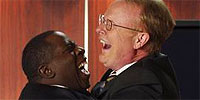 It’s amazing how things come together sometimes. On the same day that I see an episode of Boston Legal in which an important sub-plot has a chronic gambler sue a Las Vegas casino for her losses, I read about two examples of life imitiating … well, if not art exactly, then at least entertaining television.
It’s amazing how things come together sometimes. On the same day that I see an episode of Boston Legal in which an important sub-plot has a chronic gambler sue a Las Vegas casino for her losses, I read about two examples of life imitiating … well, if not art exactly, then at least entertaining television.
First, there was a story about a real-life US case in which a chronic gambler (a lawyer who should know better) is suing a Las Vegas casino for her losses. Perhaps she was influenced by this episode of Boston Legal? There, the gambling plaintiff won an excellent settlement (and the image above is of her really rather odd lawyers celebrating their unlikely victory, click on it – if you date – for more images from that episode).
Second, not too long after reading about the US lawsuit, I read a message from Prof Charles Mitchell on the Obligations Discussion Group that
in Calvert v William Hill Credit Ltd [2008] EWHC 454 (Ch) (12 March 2008) … Briggs J has declined to make a bookmaker liable for the economic loss suffered by a compulsive gambler who placed bets with them. On the facts a duty of care was owed (some interesting discussion of similar Australian cases) and the duty breached, but the claim failed on causation: the defendant only owed a duty to take care to ensure that the claimant implemented a self-exclusion arrangement, and even if this had been done, the claimant would have gone to another bookmaker and lost all his money there instead.
This does not bode well for the US plaintiff. Indeed, it is just another demonstration of the old adage that (in real life, whatever about on US television) the house always wins!
So not true. I’m up a few grand. ;) One need only implement the old adage: “Quit while you’re ahead,” and the other adage (above) does not apply. :)